I Once knew a man who did not like Masonry. That is by no means singular, for it has been clearly ascertained that besides Blanchard and the Pope Pius IX, there are several persons in the world who should be recorded in the same category.
But in this particular case there were some incidental circumstances which would servo to separate it from those of the distinguished individuals we have named, if not from the whole remaining list of dislikes of the venerable Institution.
In the first place this man of whom I write was a member of the Masonic body. I do not cull him a Mason, because I have an abiding faith that all true Masons like Masonry, and the fact that ho did not like the Institution is proof as strong as Holy Writ, to my judgment, that ho was not a Mason.
However, that may be, he had become one of the Fraternity in the regular way—had been proposed, balloted for, elected, initiated, passed, raised, etc., by the usual methods, and still he did not like Masonry.
This is one of the singular and noteworthy facts connected with this case, because a great majority, if not nearly all of those who thus proceed, like the old Institution and speak in its praise. That this member did not, after thus progressing, proves him an exception to the general rule.
Most persons like it, and do not scruple to avow the fact whenever an opportunity offers, others, few in number, perhaps, say nothing about it, while this one talked against it. Another singular fact connected with, this case, and which removes the individual from the possibility of a classification with the two distinguished gentlemen above mentioned, is that he was made acquainted with the ” true inwardness” of the Institution; had sat in Lodge and Chapter as a member for a space of two years, and consequently might have been expected to know whereof he affirmed, and to have been able to give a reason for the faith that was in him.
The gentlemen above named had not those advantages, having neglected to avail themselves of the privilege or entering the door always opened to the worthy.
It has been stated, it is true, that the Pope was a Mason before he became a Cardinal, and that he has lately be on expelled from his Lodge for un-Masonic conduct, but it is preferred to regard the tale as an idle rumour, and hence our man who did not like Masonry must not be classed with the Pope or the President.
I mention another singular fact that exists in this case ; the man who did not find that such was the case when he took the first degree. On the contrary, he liked that well. He did not find his dislike at the second degree; nor at the third degree, nor at the fourth, nor at the fifth, nor at the sixth, neither did ho find his cause for dislike to Masonry when he was inducted into the seventh degree.
It is allowable to say that ho was well satisfied at every one of the stages in his progress, for he immediately went forward until he was a Knight Templar.
His eulogies on that Order on the night of his creation were calculated to convoy a strong impression that he liked Masonry” from turret to foundation stone.” In point of fact, he stated that to be the case then and there, and it was only after a lapse of two or three years that he found that ho did not like Masonry.
It may bethought strange that it should require so long a period for him to discover the bad points in Masonry, but so it was. To an average mind it would seem that he could have discovered ” the cat in the meal ” before he had taken thirteen degrees, but, according to his own assertion, such was the fact.
He actually took all the degrees in the Lodge, Chapter, Council, and Commandery, and still had not thou found out that ho did not like Masonry.
There is still another fact in connection with this case that we must not forget to put on record. the earliest period, now recollected by the brethren, at which this member expressed that he did not like Masonry was just after an election in which he had been a candidate and defeated. He was heard to assert, when in company with brethren, that Masonry was good for nothing unless it would assist a brother in such an exigency as that, and he soundly rated those who had not voted for him.
This fact presents an inseparable obstacle to our classifying this man, who did not like Masonry, with Blanchard and the Pope, because they uniformly insist, I believe, that Masons do vote for each other against all comers, while he strenuously insists that they ought so to vote but will not. As we de not desire to injure the opposition, wo refuse to put together in the same class elements so incongruous.
It was noticed, by the strict attendants, on the meetings of the Lodge that our member was present but seldom. This was the winter following the disastrous election.
Hence it was not surprising to them that he should announce that he did not like Masonry. And as they became more intimately acquainted with him some of them wondered why he ever liked Masonry, and what induced him to join the Fraternity at all.
In the spring our man, who had faintly avowed that ho did not like Masonry, opened a dry grocery store in the village in which he lived. This fact precludes us utterly from classing him with the two distinguished men named above who do not like Masonry, for neither of them, so far as wo can learn, has ever run a grocery, wet or dry.
But the fact of the opening of this grocery could not well be omitted from a history of the case, because it is one of the horns of the dilemma on which the man, who did not like Masonry, impaled the Lodge.
Trade opened rather brisk in the afore mentioned dry grocery, and the proprietor thereof congratulated himself on the prospect that he should soon acquire an abundance of shekels, and that his brethren of the Lodge were fast becoming liberal contributors.
He congratulated himself that he had found the true use of Masonry, and that henceforth he would he able to make it pay; whereas, heretofore, to use his own phrase, ” it had not paid him the first nickel.”
Matters passed smoothly enough through the spring with our grocery man, but on the commencement of the summer there was a very noticeable falling off in his sales and receipts, and what troubled him more than this, was that many of his brother Masons began purchasing their supplies of one who was not a Mason, who kept a shop similar to his a little farther down on the opposite side.
To obviate this difficulty and repair this loss, he was seized with an intense de-sire to attend the communications of the Masonic bodies to which he belonged. Scarcely a meeting escaped him, and he became voluble in the Lodge on the blessings which followed a membership there in.
Still there were those who could not forget that he was the man who did not like Masonry, and these did not extend to him their most implicit confidence in regard to his new professions. We have all of us read the story of the old man who found a rude boy stealing his apples.
Our grocery man pursued a similar course of procedure. When he found that mild measures would not have the desired effect, he tried those more heroic.
When Lodge visits and Lodge speeches failed to bring back his customers, he renewed his asseverations that he did not like Masonry—that it had never been worth a cent to him—that he would use his great and over-powering influence to put it down, etc.
He should like to know what Masonry was good for if it would not make men patronize a brother in preference to an outsider, and here again our brother showed conclusively that he must not be classed with the distinguished dignitaries named in the first paragraph of this article.
He finds fault with Masonry because it fails to incline its members to prefer each other in business ; while they charge that very thing against it, and ever that it does compel its members to trade with a brother in preference a profane.
This is a difficult world to please, and Masonry has failed to do it in many an instance. Time passed on. Neither threats nor abuse brought back the patrons of the grocery store, and when fall arrived there was a notice of ” FOR SALE ! CHEAP FOR CASH ” over its front door.
Things looked old and dilapidated about the premises, and the countenance of the proprietor had a look as though he would hardly attempt to breakdown any more Lodges.
While matters were in this condition, one morning an old Past Master, who had not worn the threshold of that establishment for the past year, entered for the purpose of purchasing some trifling article.
As he was putting it in his pocket, the proprietor began :—
“Mr. B , had the brethren of the Lodge extended to me their patronage as I expected, I should not have been compelled to shut up or sell out now.”
” Very likely,” was the cool reply.” I think the treatment they have given me is un-Masonic and outrageous.”
” That is not so likely to be true,” came from the Past Master.” Ha! you justify such conduct!.”
“I justify the members of the Lodge in not buying of you.” ” Then you think that one member is not required by the Order of Masons to patronize another member in preference to an out-sider?”
” All other things being equal, I think it the duty of members to give their patronage to a brother just as we would trade with a friend in preference to a stranger.” ” That is what I asked of them, and they refused to trade with me in preference to my neighbour below.”
” But you forget one thing—’ all other things being equal.’ In your case all other things were not equal. You sold sugar at ten cents which your neighbour sold for nine, and most things in about the same proportion.”
” I made only a fair profit.” ” Still, he undersold you, and is apparently prosperous, while you are driven to the verge of bankruptcy . This shows that his sales gave him living profits.”
” Gave short weight perhaps ?” ” A thing you have done sometimes.”
” Do you charge me with dishonesty, sir ?” shouted the man of goods, seizing a chair as if to smite down the calumniator.
” Keep cool! There is no need of adding crime to crime. I found your weight too small and your measure too short. All that you were full in was the price. In that you never failed. I quit trading with you on that account. I presume my neighbours have done the same for the same reason. I think they did right.”
” Just as I expected ! I do not like Masonry any how.”
“And Masonry abhors the actions of which you have been guilty as nature abhors a vacuum. I do not wonder that you do not like Masonry. If you did like it, it would prove it corrupt.”
” Get off my premises! I will be insulted by your presence no longer.”
” First let me hand you a copy of charges preferred against you in the Lodge, and to say that a list of the witnesses by whom it is expected to prove them will be given you as soon as it can be arranged.”
As the old Past Master passed out, he heard his brother mumbling to himself, among the words of which he recognised the old refrain,” I never did like Masonry, and now I dislike it more than before.”
It is a fact, which has been sometimes stated, that such men as this grocery keeper hardly ever do like Masonry. Unless it will give them votes and nickels, they do not like it. So mote it be.
—Voice of Masonry
 The Freemasons Chronicle, a weekly record of masonic intelligence, was first published 2nd January 1875 London, England as an independent weekly journal of masonic interest and continued for 27 years.
The Freemasons Chronicle, a weekly record of masonic intelligence, was first published 2nd January 1875 London, England as an independent weekly journal of masonic interest and continued for 27 years.
It should be the business of a journal devoted to the interests of the Order to attempt the removal of prejudices such as these, which, though they may have little perceptible influence upon the prosperity of the Fraternity, yet have the effect of preventing timid or ill-informed persons from enlisting under its banner.
It will not only attempt to keep pace with the growing literary requirements of the day, but it will seek to exhibit the Order to the non-Masonic world divested of its technical details, and clothed in the garb of Charity and Brotherly Love.
The questions of the hour, which exercise the minds of thoughtful men, will be handled freely and broadly, without any tinge of political or sectarian bias.
The memoranda of Masonic gatherings which will appear from week to week, will be full and accurate; and as free interchange of opinion is one of the best signs of life and vigour in any society, ample scope will be given for Correspondence on topics of interest to the Order.
If we may venture upon a new rendering of words which recent events have made memorable, we will say here, once and for all, that we will be keen men of business, and will spare no effort, consistent with honour, to achieve commercial success; but first, and before all things, we will prove to our brethren and the world that we are FREEMASONS.
Recent Articles: The Freemason's Chronicle
 Operative And Speculative Masonry Explore the fascinating transition from Operative to Speculative Masonry in our latest post. Discover historical insights from Augustus C. L. Arnold and Rev. Wm. P. Strickland, shedding light on Freemasonry's evolution and its enduring principles. Dive into the rich history and significant milestones that shaped modern Freemasonry. - The Freemason's Chronicle - 2 September 1876 |
 Discover the true essence of Freemasonry, an ancient order founded on the profound principles of love for God and man. It's a call to rise above mere appearances, to embody genuine virtue and benevolence, transcending societal pretense. Embrace the transformative power of simplicity, and let the authentic glories of Freemasonry inspire your path. |
 Discover the intriguing story of a man who became a Mason but openly professed his dislike for the institution. Unravel the peculiar circumstances that led him down this path and explore the unexpected consequences that followed. Dive into this thought-provoking account that challenges our notions of loyalty and reveals the complexities of human nature within the Masonic fraternity. |
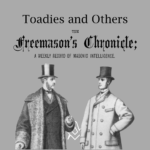 In the realm of Masonry, the principles of equality and respect are paramount. Yet, the presence of toadies—those who obsequiously seek favour from the influential—threatens these ideals. While Masonry embraces diverse beliefs and backgrounds, it rejects the sycophantic behaviours of toadies, flunkeys, and tuft-hunters, urging members to uphold genuine respect and self-worth. The Freemason's Chronicle - 22nd January 1876 |
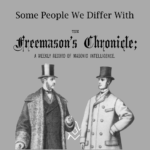 Unveiling the Unpleasant: Some People We Differ With Discover the intriguing dynamics of quarrels within the Masonic brotherhood. From the cantankerous to the litigious, the peevish to the vengeful, delve into the characters that challenge fraternal harmony. Explore their motives, temperaments, and the art of navigating disputes with these fascinating brethren. Brace yourself for a riveting journey into the world of conflicting personalities. |
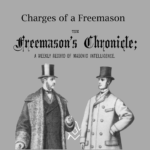 Unravelling the Masonic Mystique: A Deep Dive into the Freemasons' Charges - Explore the intricate world of Freemasonry, its principles, rituals, and the mechanisms for resolving internal disputes. Discover how this ancient fraternity fosters unity, promotes moral conduct, and upholds the sanctity of its secrets, while navigating the complexities of modern society. - The Freemason's Chronicle - 4 December 1875 |
 Unlock the hidden lessons of Masonic Studies! Don't settle for superficial knowledge or mere rituals. Discover the true depth and meaning behind Freemasonry. Expand your understanding of Tracing-Boards, Lectures, and more. Join regular Lodges of Instruction to enhance your Masonic journey. Become a knowledgeable Freemason, not just a token-bearer. Unleash the power of true Masonic wisdom today! |
 Uncover the incredible story of how Masonry saved the life of a Crimean War foot soldier in this historical and masonic account. Through the first hand experience of a soldier engaged in fierce hand-to-hand combat, witness the fateful encounter with a Russian Freemason that changed the course of his life. Learn how brotherhood and a deep dedication to the craft can lead to unforeseen and life-saving circumstances on the battlefield. |
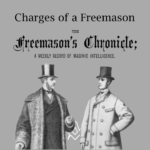 The Freemason's Chronicle - Charges of a Freemason The secrets of Masonry are the exclusive property of the Craft, and can never be communicated to one who is a mere labourer and not an accepted Mason. Hence, no labourer, that is, one who has not been regularly initiated in a legal Lodge. Article first published in The Freemason's Chronicle, 27 November 1875 |
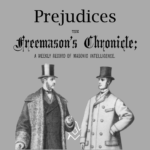 The Freemason's Chronicle - Prejudices Prejudices are partial judgments in favour of, or against certain persons or things, and, for convenience sake, may be ranged in two categories—those which are, comparatively speaking, harmless, and those which are harmful. Article first published in The Freemason's Chronicle, Oct. 2 1875. |
 The Freemason's Chronicle - Cliques Is Freemasonry - a Clique ? Man has been defined as a gregarious animal, but in his highly civilised condition he is gregarious only to a limited extent. First published in The Freemason's Chronicle, Oct. 2 1875, addresses the same challenges then as now. |
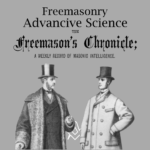 The Freemason's Chronicle - Freemasonry - an Advancive Science Is Freemasonry - an Advancive Science ? Not to confuse advancement with innovation. Has it been the case that Freemasonry's survival for 300 years plus is due to being an Advancive Science, tending to advance. First published in The Freemason's Chronicle 18 September 1875, addresses the same challenges then as now. |
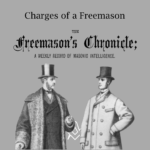 The Freemason's Chronicle - Charges Of A Freemason An interpretation of the "Charges of a Freemason", written Bro. Cornelius Moore and published in 1875, that introduce certain opinions that for some readers, will not sit well in contemporary times. - The Freemason's Chronicle, Sept. 11, 1875 |
 On The Order Of The Temple And Its Doctrine. THE Order of the Temple is divided into two great classes, denominated respectively the Order of the Temple and the Eastern Order. The Eastern Order gave birth to the Order of the Temple, and in the course of time has become an appendage of the latter. It is in ancient Egypt that we find the cradle of the Eastern Order. The Freemason's Chronicle, Sept. 4, 1875 |
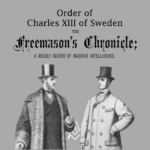 Order of Charles XIII of Sweden The following translation of the Manifesto of King JL Charles XIII of Sweden, on the occasion of his establishing the Masonic Order which bears his name, and of the Statutes of the said Order, may be interesting to our readers. The Freemason's Chronicle, Aug. 28, 1875 |
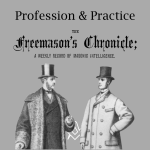 Most of our readers in the course of their experience, have doubtless met with enthusiastic brethren who take it for granted that a Mason can do no wrong. These enthusiasts are thoroughly convinced that the vast majority of those who join the Order are the most benevolent, the most moral, and the very noblest members of society. - The Freemason's Chronicle 10 July 1875 |
 An article investigating the relationship between masonry and citizenship. Are the principles of Freemasonry aligned with the freemason's claim to be a better citizen of the world? The Freemason's Chronicle - 19 June 1875 |
 A visitor must make clear his identity to the satisfaction of the Lodge he proposes to visit. More than once have we been asked to explain our views as to the reception of strangers in a Lodge. - The Freemason's Chronicle - 29 May 1875 |
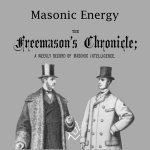 Is there reason in the accusation that Masonic energy looks only to a course of good feeds, when we can point to such grand results as have been achieved in these latter years, both in respect of the extension of our Order ? - 1May 1875 |
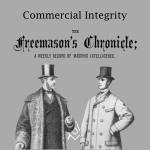 Implementing Freemasonry's peculiar system of morality in our day to day business affairs was the topic of this article, Commercial Integrity, first published in The Freemason's Chronicle - 8 May 1875 |
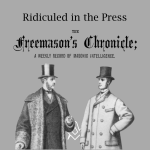 Ridicule has been somewhat illogically described as the test of truth. If it were so, Freemasonry ought to have perished long since. Two press reports from May 1875 covering the |
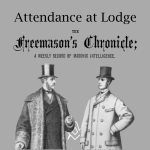 There are many things which Freemasonry will do for a man in the way of opening his mind and giving him larger and kindlier views of life, but Freemasonry itself, cannot eradicate the natural bias of the disposition. |
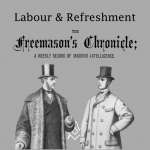 There is, we fear, too marked a tendency in very many Lodges to hasten through its labours, with a view to entering, as soon as possible, upon the business of refreshment. - The Freemason's Chronicle 17th April, 1875 |
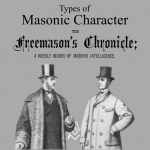 Another example that demonstrates that nothing really changes in Freemasonry. In an article the Types of Masonic Character published 145 years ago in The Freemason's Chronicle 10th April, 1875 |
 A brief history on the relationship between the British Monarchy and the craft - The Freemason's Chronicle 20th March , 1875 |
 What are the qualities of a convivial man and how does this dovetail perfectly in to Freemasonry ? 16th March, 1875 |
 A review of the "Sketch for the History of the Dionysian Artificers," a fragment, by Hyppoli to Joseph Da Costa - This little work may be regarded as, so to speak, the Holy Grail of Masonry. |
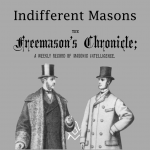 Nothing really changes, an article Indifferent Masons, From Le Monde Maçonnique 1874. Translation published in The Freemason's Chronicle 20th February, 1875 |
 In handling an intruder in the lodge, we endeavoured to show that a good Mason should be a gentleman, and a sincere man. The Freemason's Chronicle 20th February, 1875 |
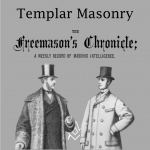 Templar Masonry - a historical aspect of the Religious and Military Order of the Temple published in The Freemason's Chronicle 13th February, 1875 |
 Secrecy perhaps the strongest objection urged by the enemies of the Masonic Order against its existence published in The Freemason's Chronicle 20th March 1875 |
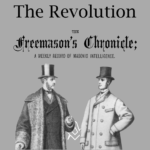 Freemasonry In The United States during And After The Revolution We take a look at Freemasonry in the United States during and after the Revolution first published in The Freemason's Chronicle - February 6, 1875 |
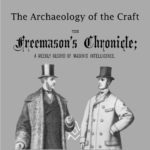 We take a look at the archaeological connection with the Craft, first published in The Freemason's Chronicle - January 30, 1875 |
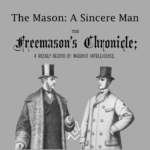 What it means to a Freemason to be a sincere man. Extract: first published in The Freemason's Chronicle - January 23, 1875 |
 What it means to a Freemason to be a citizen of the world ? First published in The Freemason's Chronicle - January 16, 1875 |
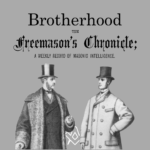 Brotherhood! In that one word what sympathetic associations arise. First published in The Freemason's Chronicle - January 9, 1875 |
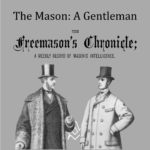 This opening article was written 145 years ago, yet it resonates with Freemasons today as it did then. First published in The Freemason's Chronicle, January 2, 1875, Issue 1 |
masonic knowledge
to be a better citizen of the world
share the square with two brothers

click image to open email app on mobile device





